

Personal/Virtual Learning Environment (PLE/VLE) Choosing a Research Topic. Ellis - Assessment Analytics. Demystifying Threshold Concepts. Journal of Learning Analytics. Current Issue Vol 2, No 1 (2015): Special section: Self-regulated learning and learning analytics Journal of Learning Analytics is a peer-reviewed, open-access journal, disseminating the highest quality research in the field.
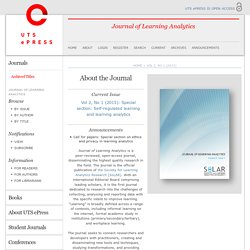
The journal is the official publication of the Society for Learning Analytics Research (SoLAR). With an international Editorial Board comprising leading scholars, it is the first journal dedicated to research into the challenges of collecting, analysing and reporting data with the specific intent to improve learning. “Learning” is broadly defined across a range of contexts, including informal learning on the internet, formal academic study in institutions (primary/secondary/tertiary), and workplace learning.
The journal seeks to connect researchers and developers with practitioners, creating and disseminating new tools and techniques, studying transformations, and providing ongoing evaluation and critique of the conceptual, technical, and practice outcomes. Khan Academy. The Brain. Learning the Corporate Culture. Learning the Corporate Culture Contents: Back to Career Contents Page To use a simple analogy, fitting into a company's corporate culture is like buying a new pair of shoes.
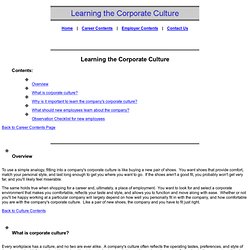
You want shoes that provide comfort, match your personal style, and last long enough to get you where you want to go. If the shoes aren't a good fit, you probably won't get very far, and you'll likely feel miserable. The same holds true when shopping for a career and, ultimately, a place of employment. Back to Culture Contents. Fenwick & Edwards Networks of Knowledge (2013) Nespor J (2011) Education is re made by Devices. Gourlay & Oliver (2013) Beyond th Social. Bayne S (2014) Technology Enhanced Learning. Sorenson E (2009) Materialities ofLearning. Communities of practice. The term “community of practice” is of relatively recent coinage, even though the phenomenon it refers to is age-old.
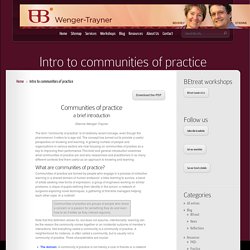
The concept has turned out to provide a useful perspective on knowing and learning. A growing number of people and organizations in various sectors are now focusing on communities of practice as a key to improving their performance.This brief and general introduction examines what communities of practice are and why researchers and practitioners in so many different contexts find them useful as an approach to knowing and learning. What are communities of practice? Note that this definition allows for, but does not assume, intentionality: learning can be the reason the community comes together or an incidental outcome of member’s interactions. CoP: Best Practices. By Etienne Wenger [Published in the "Systems Thinker," June 1998] You are a claims processor working for a large insurance company.

You are good at what you do, but although you know where your paycheck comes from, the corporation mainly remains an abstraction for you. The group you actually work for is a relatively small community of people who share your working conditions. It is with this group that you learn the intricacies of your job, explore the meaning of your work, construct an image of the company, and develop a sense of yourself as a worker. You are an engineer working on two projects within your business unit. You are a CEO and, of course, you are responsible for the company as a whole. WengerCPC. Law 2009 1. Gartner's 2014 Hype Cycle for Emerging Technologies. Gartner Hype Cycle. Emerging Pedagogy. Changing paradigms or changing caricatures? The RSA animation team came up with the following caricature of a teacher to illustrate Sir Ken Robinson’s talk about the need for a change of paradigm in education.
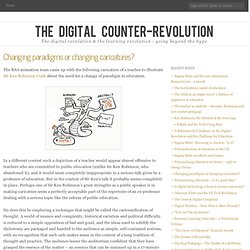
Is digital technology a boon to learner autonomy? In glowing reports of the new digital technology written by educationalists, one of the most prominent buzzwords is: autonomy.
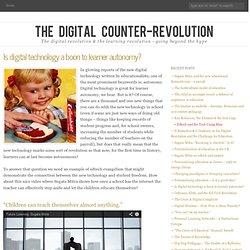
Digital technology is great for learner autonomy, we hear. But is it? Of course, there are a thousand and one new things that you can do with the new technology in school (even if some are just new ways of doing old things – things like keeping records of student progress and, for school owners, increasing the number of students while reducing the number of teachers on the payroll), but does that really mean that the new technology marks some sort of revolution so that now, for the first time in history, learners can at last become autonomous? To answer that question we need an example of edtech evangelism that might demonstrate the connection between the new technology and student freedom. How about this nice video where Sugata Mitra shows how once a school has the internet the teacher can effectively step aside and let the children educate themselves?
Educators: Embrace Social Media. What is up with teacher development and the fear of social media?
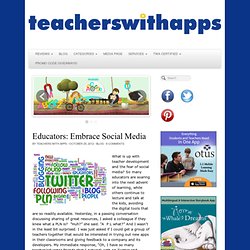
So many educators are soaring into the next advent of learning, while others continue to lecture and talk at the kids, avoiding the digital tools that are so readily available. Yesterday, in a passing conversation discussing sharing of great resources, I asked a colleague if they knew what a PLN is? ”Huh?” She said. Emerging Trends. Ecollaboration in learning teaching and research literature review. Using Wikis as a learning tool Elgort. The Augmented Web: Simplifying Augmented Reality In Education. The Augmented Web: Simplifying Augmented Reality In Education.
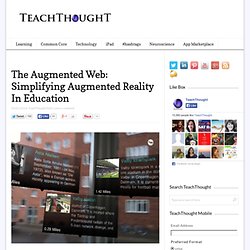
Augmented reality. Emerging Perspectives on Learning, Teaching and Technology. Wearables: Frictionless learning (5 Levels of wearable learning) This feels like the early days of mobile.
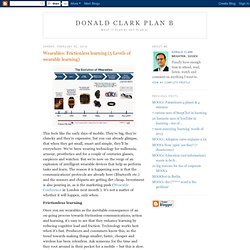
They’re big, they’re cluncky and they’re expensive, but you can already glimpse, that when they get small, smart and simple, they’ll be everywhere. Mobile learning and personal metrics. Ecollaboration in learning teaching and research literature review. Amy Cuddy: Your body language shapes who you are. Chris Kluwe: How augmented reality will change sports ... and build empathy. Visualization. Mind Mapping & Diagrams. 7 differences between mind map and Learning Map. There is no difference, you are going to say.
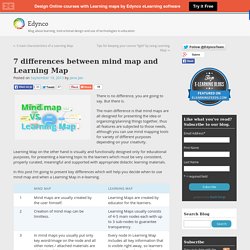
But there is. The main difference is that mind maps are all designed for presenting the idea or organizing/planning things together, thus all features are subjected to those needs, although you can use mind mapping tools for variety of different purposes depending on your creativity. Learning Map on the other hand is visually and functionally designed only for educational purposes, for presenting a learning topic to the learners which must be very consistent, properly curated, meaningful and supported with appropriate didactic learning materials. The Key To Learning: Knowing How Learning Works. What’s the key to effective learning? One intriguing body of research suggests a rather riddle-like answer: It’s not just what you know.
It’s what you know about what you know. To put it in more straightforward terms, anytime a student learns, he or she has to bring in two kinds of prior knowledge: knowledge about the subject at hand (say, mathematics or history) and knowledge about how learning works. Parents and educators are pretty good at imparting the first kind of knowledge. We’re comfortable talking about concrete information: names, dates, numbers, facts. Flexible Learning Toolboxes - Preview by Training Package. Flexible Learning Toolboxes are developed to support the training package current at the time of development. When a training package is updated, it's not always possible to update the Toolbox resources at the same time. However the Toolbox material often remains relevant, even if not an exact match. Toolboxes are fully customisable, so you can select what you need and make changes to bring it up to date or suit your circumstances. For more information on customising and getting the most out of your Toolbox, contact your state Toolbox Champion, or the Toolbox Help Desk.
Piaget's theory of cognitive development. Piaget's theory of cognitive development is a comprehensive theory about the nature and development of human intelligence, first developed by Swiss developmental psychologist Jean Piaget (1896–1980). It is primarily known as a developmental stage theory but, in fact, it deals with the nature of knowledge itself and how humans come gradually to acquire, construct, and use it. To Piaget, cognitive development was a progressive reorganization of mental processes as a result of biological maturation and environmental experience. Accordingly, children construct an understanding of the world around them, then experience discrepancies between what they already know and what they discover in their environment.[1] Moreover, Piaget claimed the idea that cognitive development is at the center of human organism, and language is contingent on cognitive development.
List of Sites for Learning. Theories and Methods of learning. eLearning article by George Siemens. Theories of Cognitive Development: Lev Vygotsky. Theories of Cognitive Development: Lev Vygotsky. November 3, 2010 at 3:00 pm For my previous post on Jean Piaget’s theory of cognitive development, click here.
As with my previous post, I will explain a little about Vygotsky and his life before we look at his theory. Lev Vygotsky Born in Orsha, a part of the Russian Empire (now known as Belarus) on 17th November 1896, Vygotsky was a pioneer of psychology; he contributed much important research to the field. Vygotsky rarely conducted research; he was more focused on constructing the best possible theory on the transfer of knowledge.
Transhumanisme : aujourd’hui, l’Homme réparé. Credit : sous licence CC, par Kosmur. Experiential Learning & Experiential Education: Philosophy, theory, practice & resources. Several authors (e.g., Kraft, 1991; Richards, 1977) have pointed out that experiential learning dates back beyond recorded history and remains pervasive in current society, whether formalized by educational institutions or occurring informally in day-to-day life. In this sense, experiential learning is not an alternative approach, but the most traditional and fundamental method of human learning. Ironically, the current perception of experiential education as different is probably less due to new developments in experiential learning than it is to the normalization of didactic teaching as the mainstream educational methodology.
Since the 1950's there has been a growing focus in writings and research specifically on experiential learning. Major sources for such material related to experiential learning in the outdoors are journals, conferences, books (e.g., edited texts that focus on current thinking in experiential learning such as Boud, et al., 1993; Weil & McGill, 1989), and websites. 2005 siemens ALearningTheoryForTheDigitalAge. Bloom’s Revised Taxonomy. Bloom's Taxonomy. Introduction to Threshold Concepts. This and its associated pages were originally written to support the Study Days on "Threshold Concepts" which were part of the University of Bedfordshire's PGCE/Cert Ed (Post-Compulsory Education) programme in 2007-2008 (and continue to be so at the time of writing).
They have been minimally edited to make sense as stand-alone pages. "A threshold concept can be considered as akin to a portal, opening up a new and previously inaccessible way of thinking about something. It represents a transformed way of understanding, or interpreting, or viewing something without which the learner cannot progress. " Threshold concept. This article or section is a stub. Demystifying Threshold Concepts. Threshold concepts in research education and evidence of threshold crossing - Higher Education Research. Threshold Concepts and Troublesome Knowledge: Linkages to Ways of Thinking and Practising within the Disciplines. Threshold concept: A lens for examining networked learning. Threshold concepts media presentation. Introducing Theshold Concepts 1.
Threshold Concepts. Threshold concepts in research education and evidence of threshold crossing - Higher Education Research. An introduction to threshold concepts. Threshold concepts. Most of our planning for teaching is pretty crude. It's worse than that, it's hopeless. Neither teacher-centred nor student-centred: threshold concepts and research partnerships. Threshold Concepts within the Disciplines: Amazon.co.uk: Ray Land, Jan Meyer, Jan Smith: Books.
Trade in your item Get a £6.00Gift Card. Flip to back Flip to front Listen Playing... Paused You're listening to a sample of the Audible audio edition. Online learning insights. The Web as a classroom is transforming how people learn, is driving the need for new pedagogy; two recently launched courses at Coursera highlight what happens when pedagogical methods fail to adapt. Connectivism. Connectivism: Learning theory of the future or vestige of the past? Innovating Pedagogy 2013. Connected Learning. The Essence of Connected Learning. Elearnspace. Connectivism: A Learning Theory for the Digital Age. Are We in an An Age of Collective Learning? An Introduction to Connective Knowledge ~ Stephen's Web ~ b. Learning in the Future. Learner-based Teaching. Pedagogy & Issues in Higher Education. The future of education technology.
Big Think. From E-Learning to We-Learning. The SAMR Model – Enhancing Technology Integration. Educators as Social Networked Learners. Self-Directed Learning. Why Blended Learning Is Better. 5 reasons why blended learning works. The Definition Of Blended Learning. Comm Theory Persuassion - 4985 Dainton Chapter 5. Locus of Control.
~ Stephen's Web. The Connectivist Learning Environment. Connectivism: Learning theory of the future or vestige of the past? Daphne Koller: What we're learning from online education. Connectivism: Learning theory of the future or vestige of the past? Conectivismo. Connectivism. eLearning article by George Siemens. Comm Theory Persuassion - 4985 Dainton Chapter 5. Constructivist Learning Theory. 5 Ways to Inspire Students Through Global Collaboration.